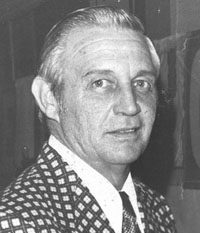
Maxie Lambright
Sport: Coach
Induction Year: 1986
University: Louisiana Tech
Induction Year: 1986
In 1970, Maxie Lambright’s Louisiana Tech Bulldogs lost seven consecutive football games—five of them by margins of six points or less. Their next opponent was Southern Mississippi, which had upset an Ole Miss team quarterbacked by Archie Manning two weeks earlier.
Without Terry Bradshaw and the other outstanding athletes that Lambright inherited from the Joe Aillet Era, the Bulldogs were struggling. Even with those players, Tech had managed only one victory over Southern Mississippi in the previous six years—three apiece under Aillet and Lambright.
The 1970 Tech team responded with a 27-6 victory over the Golden Eagles, setting the stage for a 44-4 run through the next four seasons that included five post-season victories, four Southland conference championships, two national titles and the nation’s longest winning streak (23 games) in 1973 and 1974.
When he resigned as Tech’s head coach on March 1, 1979, Lambright said, “Never once have I felt that a Louisiana Tech football team wasn’t playing without a purpose and will to win.”
In his 12 seasons as the Bulldogs’ head coach, Tech won 95 games, lost 36 and tied two for a winning percentage of .730. His teams won seven conference championships and five assorted national titles on the college division level, including the first NCAA football championship (1973) ever determined by a playoff system.
When Lambright stepped down, nine of his former Tech players were active in pro football and the Bulldogs had been represented on All-American teams in 11 consecutive years.
Lambright said it was a team effort. The coaching staff he put together in 1967 remained virtually intact throughout those 12 seasons. Along with E.J. Lewis, the only holdover from Aillet’s staff, the group included Mickey Slaughter, Pat Patterson, Pat Collins and Wallace Martin, who replaced Tony Misita in 1970. Slaughter had played for Lambright at Alexandria’s Bolton High in the late 1950s before a record-breaking career at Tech and a brief stint in the American Football League. Patterson and Collins were assistant coaches at Shreveport-Bossier City high schools when Lambright tool over the coaching reins at Tech. The only member of the group who wasn’t a Tech graduate was Lambright, who attended Southern Mississippi.
As individuals, the Tech coaching staff represented a wide range of personalities and interests. “You might find two in church, two in a bar and two who would go either way,” one observer suggested. But Lambright brought them together as a group with a single-minded purpose.
“He provided stability for the whole staff,” said Lewis.
A popular notion about coaches is that they raise cain when things are going badly. Television commentators suggest that the coach of the losing team may be breaking furniture, tearing lockers off walls and blistering his players’ ears during the halftime intermission. Practice sessions the week after a loss are likened to boot camp.
Lambright’s approach was exactly the opposite. He tightened the screws when the Bulldogs were on a roll, because that is when a team is likely to become complacent and lose its concentration. During the few slumps his teams suffered, he eased up—because that was when the players needed a boost in confidence.
“The more success we had,” recalled Patterson, “the harder we worked, both as a staff and a team.”
The first time Lambright came to Louisiana, He was in the wrong place at the wrong time. After a successful high school career in McComb, Miss., he went to LSU in the spring of 1946 as a candidate for the quarterback position. But Y.A. Tittle had that position locked up for Bernie Moore’s Tigers, so Lambright transferred to Southern Mississippi.
He launched his coaching career in Mississippi high school football, spending six as an assistant at Greenwood and Greenville. After four more years as a head coach in high school football (one at Winona, Miss., and three at Bolton), he returned to his alma mater, Southern Mississippi, as offensive backfield coach for six years before he landed his last coaching assignment—head coach at Louisiana Tech.
“After walking the sidelines for 30 years,” he said on March 1, 1979, “it is time to give someone else the opportunity to have some of this joy, agony, acclaim, heartbreak and that other good stuff.”
He died of cancer less than one year later.










